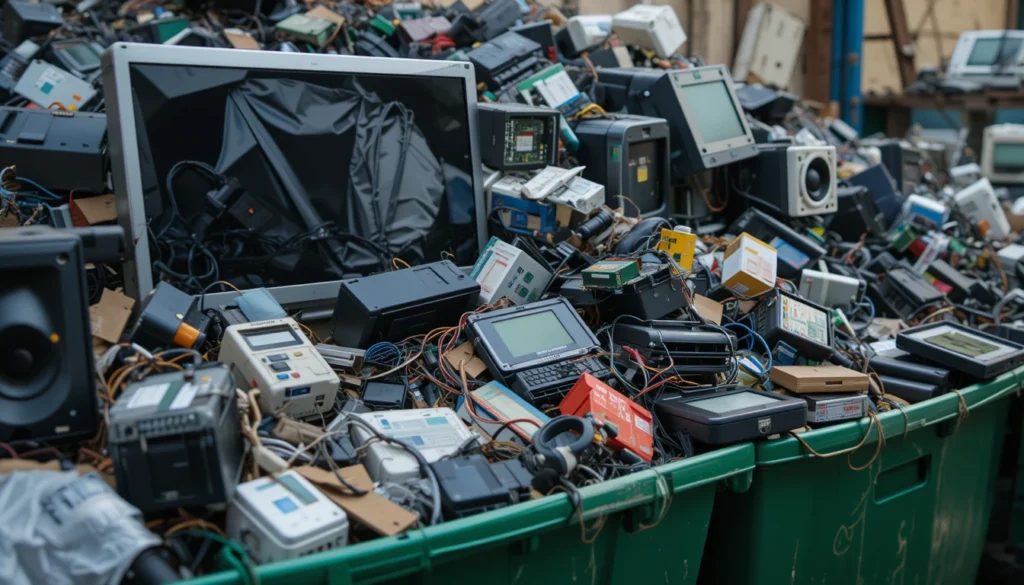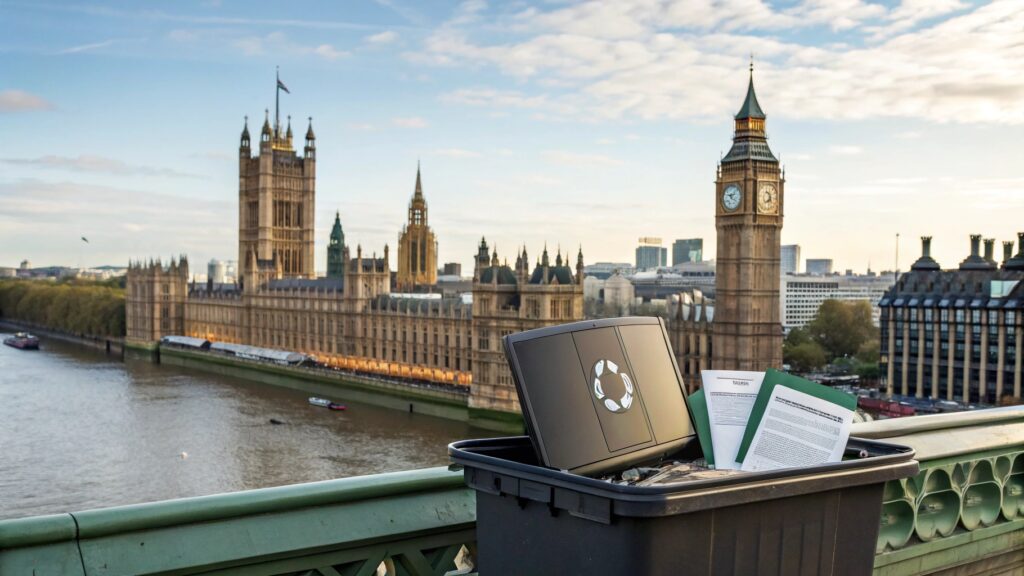The digital age has brought convenience, but it has also increased electronic waste. London, one of Europe’s leading tech hubs, faces mounting pressure to deal with discarded IT equipment responsibly.
Computer recycling in London offers a way to combat the growing problem of e-waste while helping individuals and businesses meet legal and ethical obligations. This guide explores everything from top providers and regulations to lesser-known programs that combine recycling with social impact.
Computer Recycling Explained — Why It Matters in London?

In a fast-paced, tech-driven city like London, computer recycling is more than just a responsible choice—it’s a legal and environmental necessity. With thousands of outdated computers and laptops discarded each year, proper disposal helps reduce toxic e-waste, protect sensitive data, and comply with regulations like the WEEE Directive and GDPR.
By choosing certified computer recycling in London, both businesses and individuals contribute to a cleaner environment, support the reuse of valuable materials, and promote a circular economy. In a city striving to lead in sustainability and innovation, ethical IT disposal is a key part of the digital future.
Top Computer Recycling Services in London!
| Company Name | Key Features | Free Collection | Data Destruction | Ideal For | Rating (Out of 5) |
| Revive IT Recycling | Secure, WEEE compliant, full documentation | Yes | Yes | Businesses & Individuals | 4.9 |
| London Computer Recycling Charity (LCR) | Refurbishes and donates to those in need | Yes | Yes | Charity-minded individuals | 4.9 |
| Premier IT Disposal | Onsite service, business-focused recycling | Yes | Yes | Medium-to-large businesses | 5.0 |
| EcoGreen IT Recycling | ISO certified, zero-landfill policy | Yes (bulk) | Yes | Environmentally focused orgs | — |
| Junkwize | Household & business, WEEE compliant | Yes | Yes | General public, SMEs | 4.5 |
Also Read: Why Secure Data Destruction Is Non-Negotiable in 2025
What Is Computer Recycling?
Computer recycling is the process of safely disposing, reusing, or repurposing outdated or unwanted computer equipment in an environmentally friendly and secure manner. It involves dismantling hardware, extracting valuable materials like metals and plastics, securely destroying data, and ensuring that harmful components—such as batteries and circuit boards—are not sent to landfills.
In London, computer recycling plays a vital role in reducing electronic waste, conserving natural resources, and preventing sensitive data from falling into the wrong hands. With proper recycling, devices are either refurbished for reuse or processed in compliance with environmental regulations like the WEEE Directive.
Must Check: The Ultimate Guide to Certified Data Destruction and IT Recycling in the UK
What Types of Devices Can You Recycle in London?

Desktop and Laptop Computers:
Old desktops and laptops are among the most commonly recycled IT assets in London. These devices often contain valuable components like hard drives, RAM, and circuit boards, as well as sensitive personal or corporate data. Certified recycling services ensure secure data destruction and responsible disposal in line with WEEE and GDPR regulations.
Tablets and Mobile Phones:
Smartphones and tablets also qualify for computer recycling in London. These devices hold metals like lithium and cobalt and often store sensitive data. Many recycling companies refurbish usable phones and tablets for donation or resale, reducing e-waste and supporting digital inclusion initiatives.
Printers, Scanners, and Photocopiers:
Large and small office peripherals—such as printers, scanners, and copiers—are accepted by most professional IT recycling services. These devices are carefully dismantled to extract reusable plastics and metals while ensuring any ink or toner residue is disposed of safely.
Networking Equipment:
Routers, switches, modems, and network cables are also recyclable. Businesses often overlook these components when upgrading IT infrastructure. Recycling these items prevents them from being dumped in landfills and supports the recovery of copper and plastic components.
Hard Drives and Data Storage Devices:
Hard drives, SSDs, USB sticks, and external storage units contain sensitive data and should never be discarded without secure erasure. London’s top computer recycling providers offer certified data destruction, including degaussing and physical shredding, with audit-ready documentation for businesses.
How Computer Recycling Works in London?
- Initial Assessment and Collection
- Professional evaluation of your electronic waste type and quantity
- Many services offer free, convenient collection from homes or businesses
- Professional evaluation of your electronic waste type and quantity
- Secure Data Destruction
- Hard drives and storage devices securely wiped or physically destroyed
- Methods include shredding, degaussing, and certified software erasure
- Certificates of data destruction provided for GDPR compliance
- Hard drives and storage devices securely wiped or physically destroyed
- Sorting and Categorization
- Devices sorted by condition: reusable, refurbishable, or for material recovery
- Hazardous components separated for safe handling
- Devices sorted by condition: reusable, refurbishable, or for material recovery
- Component Recovery and Recycling
- Valuable materials like gold, copper, aluminum, plastics, and glass extracted
- Recycled materials processed into raw materials for new products
- Helps reduce demand for mining and manufacturing new resources
- Valuable materials like gold, copper, aluminum, plastics, and glass extracted
- Proper Disposal of Hazardous Waste
- Toxic elements such as lead, mercury, and cadmium carefully disposed of
- Compliance with strict environmental regulations to prevent contamination
- Toxic elements such as lead, mercury, and cadmium carefully disposed of
- Documentation and Reporting
- Detailed certificates and waste transfer notes provided
- Essential for businesses to prove regulatory compliance and support CSR initiatives
- Detailed certificates and waste transfer notes provided
Recent Post: How UK Businesses Can Securely Dispose of Old IT Equipment and Recycle Responsibly
Business vs Individual IT Recycling – Pros, Cons & Best Options Explained!
Business IT Recycling – Pros:
- Includes secure data destruction and GDPR compliance
- WEEE-compliant processes for legal peace of mind
- Bulk collection services available (often free)
- Detailed asset tracking and disposal certificates
- Tailored solutions for offices, schools, and organizations
Business IT Recycling – Cons:
- May require minimum equipment volume for free pickup
- Can involve scheduling logistics or contract commitments
- Slightly more complex onboarding or documentation process
Individual IT Recycling – Pros:
- Easy, hassle-free booking (no contracts or volume limits)
- Ideal for home users or small tech clearouts
- Many services offer free doorstep pickup
- Often supports community donations or refurbishing efforts
Individual IT Recycling – Cons
- Less likely to include full audit trails or certificates
- Limited data destruction methods (in some cases)
- May not accept all types of enterprise-grade equipment
Best Options in London:
- Businesses: Revive IT, Premier IT Disposal, EcoGreen IT
- Individuals: London Computer Recycling Charity (LCR), Junkwize
Related Post: Certified Data Destruction – Top Methods, Tools & Compliance Tips!
What documentation should I expect after recycling?

After recycling your computers in London, reputable recycling services typically provide key documentation to ensure transparency and compliance. This includes a Certificate of Data Destruction confirming that all sensitive information was securely erased or destroyed, and a Waste Transfer Note or Recycling Receipt that verifies your electronic waste was handled according to environmental regulations. These documents are especially important for businesses to meet legal obligations such as GDPR and WEEE directives.
FAQs:
How to dispose of old computers in the UK?
You can dispose of old computers in the UK by using certified computer recycling services that comply with the WEEE Directive. Many local councils offer e-waste collection points, or you can use professional recyclers who provide free collection, secure data destruction, and environmentally responsible disposal.
How can I dispose of my old PC?
To dispose of your old PC safely, ensure all personal data is securely erased or physically destroyed. Then, either donate if the PC is still usable, recycle it through an accredited service, or use local council e-waste facilities. Avoid throwing it in general waste to prevent environmental harm.
Does London Drugs recycle computers?
London Drugs primarily operates in Canada and is not a UK-based service. For computer recycling in London, UK, it’s best to use local certified recyclers who follow UK environmental laws and data security standards.
Do I need to remove the hard drive before recycling my computer?
While not always mandatory, removing the hard drive before recycling is recommended for data security. Alternatively, use a recycler that guarantees certified data destruction and provides a certificate to ensure your data is fully protected.
How to dispose of hard drives in the UK?
Hard drives should be disposed of via certified e-waste recyclers who offer secure data destruction through shredding or degaussing. This protects sensitive information and ensures compliance with data protection laws like GDPR.
Conclusion:
Computer recycling in London is an essential practice that supports environmental sustainability, data security, and regulatory compliance. Whether you’re an individual upgrading your home setup or a business managing large-scale IT disposal, choosing certified recycling services ensures your old devices are handled responsibly.
Latest Post:


